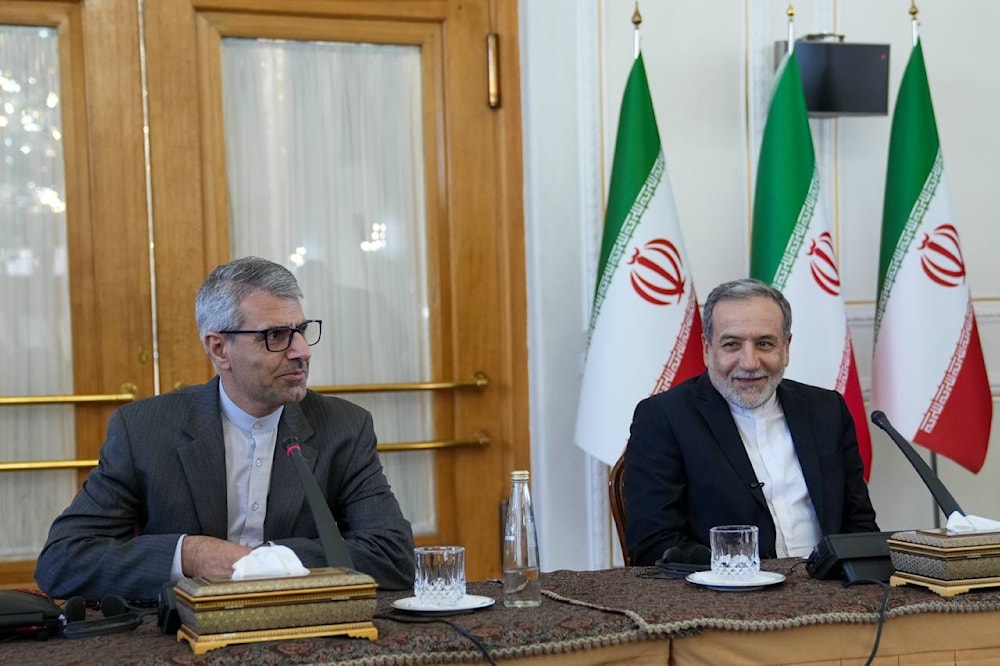Araghchi: Iran committed to diplomacy despite Western escalation
Iranian FM Abbas Araghchi says Western powers have complicated nuclear talks through “unreasonable” demands and the snapback threat.
-

Iran's Foreign Minister Abbas Araghchi, right, and spokesperson for the Iranian Foreign Ministry Esmail Baghaei, left, meet with ambassadors and the press, in Tehran, Iran, on October 5, 2025. (Telegram/s_a_araghchi)
Iranian Foreign Minister Abbas Araghchi reaffirmed that Tehran continues to seek a fair and balanced diplomatic resolution to its nuclear file, criticizing Western powers for derailing negotiations through “unreasonable” and “excessive” demands.
Speaking during a meeting with ambassadors and heads of foreign missions in Tehran, Araghchi outlined Iran’s position following recent Western moves at the United Nations Security Council (UNSC) and the activation of the “snapback mechanism,” a move that reimposed international sanctions on Iran.
‘Snapback’ complicates diplomacy
Araghchi stressed that Iran’s approach has always prioritized dialogue over confrontation, adding that both military threats and political pressure have repeatedly failed to resolve the issue.
“Experience has proven that there is no solution other than a diplomatic and negotiated solution to Iran's nuclear program,” he said.
“In recent years, there have been repeated threats of military attacks, but this approach has failed to resolve any issues. The Europeans also threatened to trigger the snapback mechanism, but like the military option, this measure has proven ineffective and has only made the negotiation process more complicated and difficult,” he emphasized.
He added that the European troika - France, Germany, and the UK - “believe they can reach their goals through the snapback lever,” yet this approach “only makes diplomacy more difficult.”
Read more: Larijani: Europe mistaken to expect concessions from Iran
Changing dynamics of negotiations
The Iranian Foreign Minister explained that the structure and participants of the diplomatic process have evolved under current circumstances, with the European role in future negotiations “certainly diminished.”
Araghchi noted that indirect talks with the United States have been limited strictly to the nuclear file, denying claims about broader political conditions. He said Iran’s proposals were “completely transparent” and that a negotiated settlement would have been achievable “had Western countries shown goodwill and respected mutual interests.”
Read more: China says US withdrawal from JCPOA triggered Iran nuclear crisis
Touching on Iran’s cooperation with the International Atomic Energy Agency (IAEA), Araghchi announced that Tehran had reached a new technical cooperation framework with the agency to replace the previous Cairo agreement, which he said was “no longer sufficient under current conditions, including security threats and the snapback mechanism.”
“Iran has pursued all diplomatic channels, cooperation, and consultations, and presented constructive and balanced proposals to prove the peaceful nature of its nuclear program,” he stated.
Araghchi also explained that Iran’s positions remain “completely legitimate and justifiable,” emphasizing that Tehran is “ready to pursue any solution that leads to confidence-building while preserving its rights.”
Read more: Russia slams efforts to revive Iran sanctions via snapback mechanism
Global support for Iran’s responsible conduct
Reflecting on the aftermath of a recent aggression against Iran, Araghchi highlighted that “more than 120 countries and nearly all international organizations” condemned the aggression and voiced support for Tehran. He attributed this to Iran’s “wisdom, reasonableness, and intelligence” as a responsible actor committed to diplomacy.
“Today, Iran has once again shown that, while preserving its rights, it is fully prepared for any solution that can secure the interests of both parties and create confidence in the country's peaceful nuclear program,” Araghchi concluded.
Read more: IRGC marks Op. True Promise 2, vows heavier response to 'Israel'

 3 Min Read
3 Min Read










